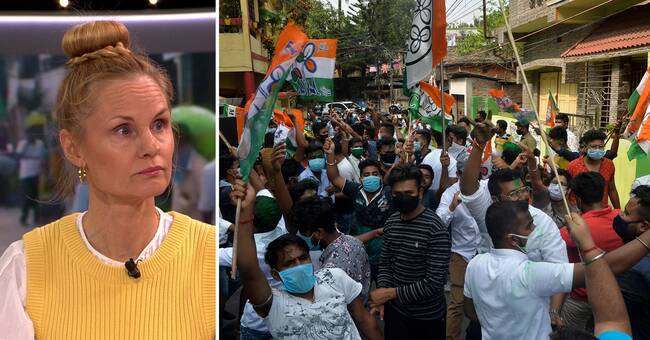Many ask me how come political mass meetings have been allowed in India in the midst of a pandemic?
My answer is that when the campaigns started, the infection rates were low in India.
Since then, they have run on despite the fact that infection rates have increased, as victories in the spring state elections have been very important - both for India's ruling party BJP and the opposition.
The Battle of West Bengal
Above all, the battle has concerned the populous West Bengal.
This state wanted the BJP to win to become a party for the whole of India, with a majority in most states.
But even for the opposition, this particular state is very important, as it is led by a woman Mamata Banerjee who is known as a strong critic of the BJP government in Delhi.
If the opposition were to lose West Bengal, there would no longer be any opposition to speak of in India, some observers said.
But the BJP did not succeed in seizing power in West Bengal.
Mamata's party Trinamool Congress (TMC) won a landslide victory with about two-thirds of the seats in the state parliament.
Nor has the BJP won the state elections in southern India.
It may be the current wave of infections in India that has created dissatisfaction with the government and the Hindu nationalist BJP.
Prime Minister Narendra Modi has been accused of prioritizing election campaigns and Hindu gatherings over infection control.
Social distance has not been maintained and in India as well as in the rest of the world, images of people dying outside hospitals are being wired out, as there is a shortage of places, oxygen and medicines.
Apart from the fact that the rising death toll is a disaster for India, the situation is serious for the rest of the world.
The world's largest vaccine producer
India is the world's largest vaccine manufacturer and manufactures huge quantities of vaccines against covid, including Astra Zenecas.
And initially, India also exported covid vaccine to over 80 countries.
However, due to the dramatic spread of infection now taking place within the country, India has stopped exporting vaccines against covid.
This means that a large number of countries simply have to wait for large amounts of doses.
The spread of infection in India is also a cause for concern as new mutations are formed, which can be both more dangerous and more contagious and make today's vaccines ineffective - and even this could affect the rest of the world.

